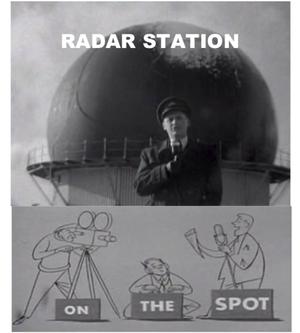| Canada's Story | |
|---|---|
| Genre | historical documentary |
| Country of origin | Canada |
| Original language | English |
| No. of seasons | 1 |
| No. of episodes | 20 |
| Production | |
| Running time | 60 minutes |
| Production company | National Film Board of Canada |
| Original release | |
| Network | CBC Television |
| Release | 5 September – 30 September 1966 |
Canada's Story is a Canadian historical documentary television series which aired on CBC Television in 1966.
This 20-part series Canadian history was produced by the National Film Board of Canada (NFB). Most episodes were compiled from previous film series such as The Struggle for Self-Government (1961), Prelude to Confederation (1962) and Explorers (1964) and generally grouped under the overall NFB title The History Makers. The overall time line of the series covered the past four centuries. [1]
Episodes included dramatic portrayals of historic figures such as Henry Hudson (Powys Thomas), Sir John A. Macdonald (Robert Christie), Alexander Mackenzie (Don Francks) and David Thompson (James Douglas). Numerous producers and directors created the films.
This hour-long series was broadcast weekdays at 4:00 p.m. (Eastern) from 5 to 30 September 1966.

The National Film Board of Canada is Canada's public film and digital media producer and distributor. An agency of the Government of Canada, the NFB produces and distributes documentary films, animation, web documentaries, and alternative dramas. In total, the NFB has produced over 13,000 productions since its inception, which have won over 5,000 awards. The NFB reports to the Parliament of Canada through the Minister of Canadian Heritage. It has bilingual production programs and branches in English and French, including multicultural-related documentaries.

Sydney Cecil Newman was a Canadian film and television producer, who played a pioneering role in British television drama from the late 1950s to the late 1960s. After his return to Canada in 1970, Newman was appointed acting director of the Broadcast Programs Branch for the Canadian Radio and Television Commission (CRTC) and then head of the National Film Board of Canada (NFB). He also occupied senior positions at the Canadian Film Development Corporation and Canadian Broadcasting Corporation, and acted as an advisor to the Secretary of State.

Canada: A People's History is a 17-episode, 32-hour documentary television series on the history of Canada. It first aired on CBC Television from October 2000 to November 2001. The production was an unusually large project for the national network, especially during budget cutbacks. The unexpected success of the series actually led to increased government funding for the CBC. It was also an unusual collaboration with the French arm of the network, which traditionally had autonomous production. The full run of the episodes was produced in English and French. The series title in French was Le Canada: Une histoire populaire. In 2004, OMNI.1 and OMNI.2 began airing multicultural versions, in Chinese, Greek, Hindi, Italian, Polish, Portuguese, and Russian.

The Greatest Canadian is a 2004 television series consisting of 13 episodes produced by the Canadian Broadcasting Corporation (CBC) to identify one greatest Canadian of all time, according to those who watched and participated in the program.
This is a chronological list of films and television programs that have been recognized as being pioneering in their use of computer animation.
The history of Canadian animation involves a considerable element of the realities of a country neighbouring the United States and both competitiveness and co-operation across the border.

"Harry" Winston Jerome was a Canadian track and field sprinter and physical education teacher. He won a bronze medal at the 1964 Olympics in Tokyo and set a total of seven world records over the course of his career.

Michael Sarrazin was a Canadian actor. His most notable film was They Shoot Horses, Don't They?.
Don Owen was a Canadian film director, writer and producer who spent most of his career with the National Film Board of Canada (NFB). His films Nobody Waved Good-bye and The Ernie Game are regarded as two of the most significant English Canadian films of the 1960s.

The Valour and the Horror is a Canadian television documentary miniseries, which aired on CBC Television in 1992. The series investigated three significant Canadian battles from the Second World War and was a co-production between the CBC, the National Film Board of Canada (NFB) and Galafilm Inc. The films were also broadcast by Radio-Canada, the French network of the CBC. The series was written by Brian McKenna, an award-winning journalist and founding producer of The Fifth Estate and his brother, Terence McKenna, and was directed by Brian McKenna.
Bonnie Sherr Klein is a feminist filmmaker, author and disability rights activist.

Gerald Potterton was a Canadian director, animator, producer and writer. He is best known for directing the cult classic Heavy Metal and for his animation work on Yellow Submarine.
Canada Vignettes are a series of short films by the National Film Board of Canada (NFB), some of which aired on CBC Television and other Canadian broadcasters as interstitial programs. The vignettes became popular because of their cultural depiction of Canada, and because they represented its changing state, such as the vignette Faces which was made to represent the increasing cultural and ethnic diversity of Canada. The Log Driver's Waltz directed by John Weldon set to the recording of the song by Kate & Anna McGarrigle with, and as part of, The Mountain City Four is one of the most-requested items contained in the collection by the National Film Board of Canada. A similar series was later produced in the 1990s, however the name was changed to Heritage Minutes.
On the Spot was the first television series made specifically for TV by the National Film Board of Canada, and aired on CBC Television from 1953 to 1955. Each episode reported on a different aspect of life in Canada and was introduced with the line "The National Film Board’s up-to-the-minute report of what’s happening somewhere in Canada”. The series was originated by Bernard Devlin, with Robert Anderson as executive producer.
Candid Eye is a Canadian documentary television series which aired on CBC Television in 1958 and was expanded into 1961.
Pacificanada is a National Film Board of Canada (NFB) Canadian documentary television miniseries about British Columbia which aired on CBC Television in 1975.
John Kemeny was a Hungarian-Canadian film producer whom the Toronto Star called "the forgotten giant of Canadian film history and...the most successful producer in Canadian history." His production credits include The Apprenticeship of Duddy Kravitz, Atlantic City, and Quest for Fire.

Transpacific Flight is a 1953 Canadian short documentary film, part of the On The Spot series made specifically for television, produced by the National Film Board of Canada (NFB). The documentary involved an account of a flight across the Pacific Ocean in 1953, based on first-person interviews of the flight crew.

Radar Station is a 1953 Canadian short documentary film produced by the National Film Board of Canada (NFB) as part of the On The Spot series made specifically for television. The documentary involved an account of a visit to a radar station while it is involved in a simulated air attack, and is based on first-person interviews of the staff at the radar station.
Julian Biggs (1920–1972) was a director and producer with the National Film Board of Canada and its first Director of English Production. Over the course of his 20-year career, he created 146 films, two of which were nominated for Academy Awards. His film 23 Skidoo (1964) received two BAFTA nominations, including the BAFTA United Nations award.